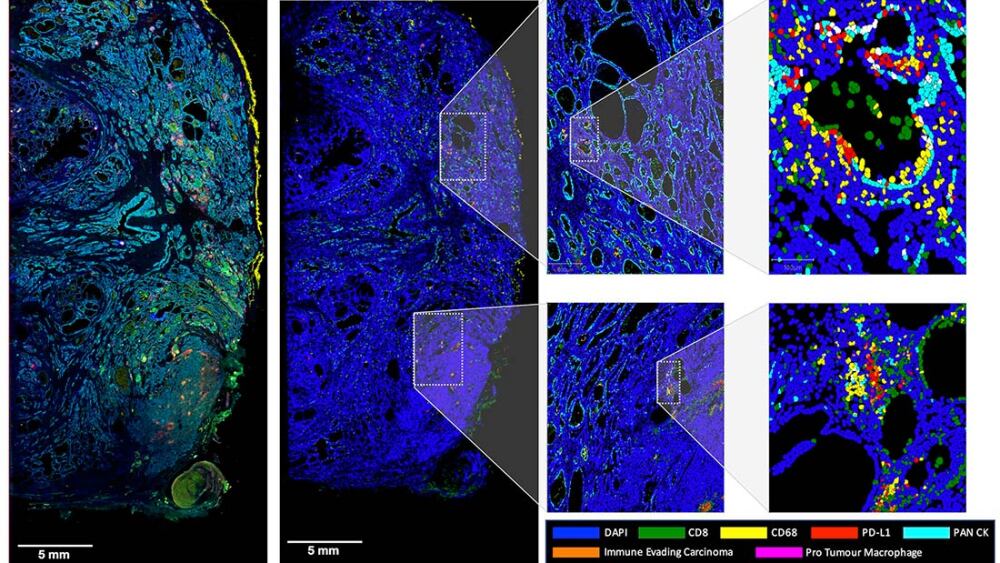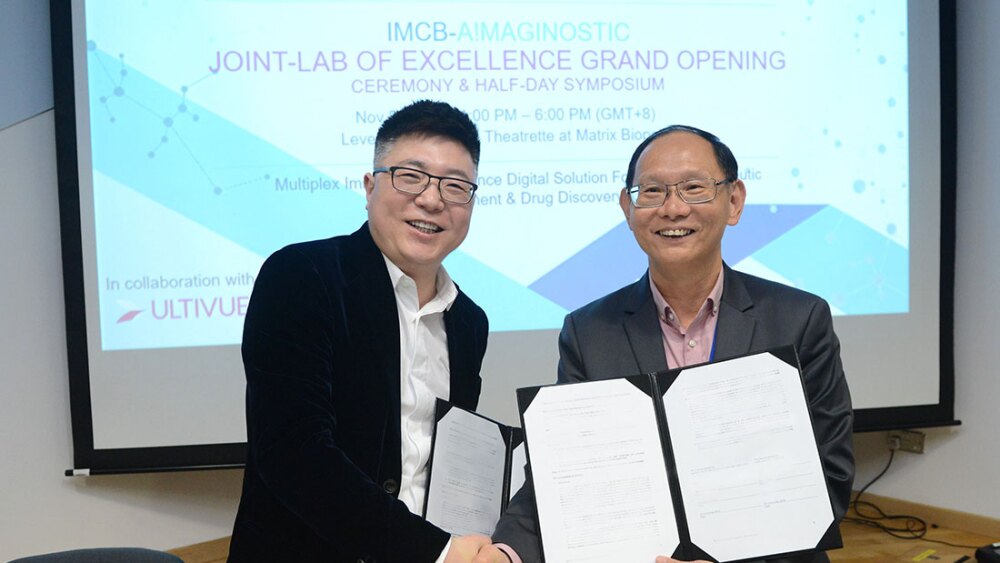The collaboration will use Image Processing and Artificial Intelligence/Machine Learning to revolutionise pathology practice and provide more precise cancer diagnostic assays
The collaboration will use Image Processing and Artificial Intelligence/Machine Learning to revolutionise pathology practice and provide more precise cancer diagnostic assays
SINGAPORE, 25 NOVEMBER 2019 – A!maginostic (A!), an A*STAR spin-off1 that specialises in computational digital pathology, and A*STAR’s Institute of Molecular and Cell Biology (IMCB) have launched a joint digital immuno-oncology laboratory.
Located at IMCB, the new IMCB-A!maginostic Joint Lab of Excellence aims to provide artificial intelligence (AI) and machine learning (ML) solutions to support computational digital and multiplex pathology, by integrating multi-modality images and clinical data, including patient treatment and survival status.
Image Caption: A prostate cancer patient sample stained using UltiMapperTM I/O PD-L1 kit. Multiple immune cells and cancer relevant cells are simultaneously stained and visualised digitally, where accurate cell-by-cell information is extracted using advanced AI-based methods.
Image credit: A*STAR, NUH, A!maginostic
Through this partnership, the lab’s goal is to speed up and improve the workflow of pathologists, enabling more accurate diagnosis for cancer which can help to speed up drug development for treatment. The lab will support the medical and research communities, and will be open to partner biotech companies to develop new capabilities in digital pathology.
The lab will build a cloud-based large-scale pathology database of annotated cancer tissue images to develop AI and ML algorithms for digital diagnosis. A! has licensed A!HistoNote, a cloud-based digital pathology annotation technology solution from A*STAR’s commercialisation arm A*ccelerate, for this purpose. The database will start with prostate and breast cancers, and eventually extend to other major cancer indications such as endometrial cancer, liver cancer and lung cancer.
The lab’s approach is to provide a complete service solution ranging from staining, scanning, storage and analysis of specimens stained by hematoxylin and eosin (H&E), to immunohistochemistry (IHC) and multiplex immunofluorescence (MIF). The services on offer include multiplex immunostaining, digital Whole Slide Image (WSI) scanning, large data storage and management system, AI/ML-based image processing/analysis, and informatics and modelling solutions. IMCB and A!maginostic have signed a three-party MOU with Ultivue Inc., a provider of kits and reagents for multiplex tissue marker detection and quantification, to support the Joint Lab of Excellence research activities.
Professor Hong Wanjin, Executive Director of IMCB, said, “The joint lab is an example of the outcome of use-inspired and mission driven research of IMCB. IMCB will keep focusing on novel technology development and its future commercialisation to realise the social and economic value of research work. This joint lab provides a unique platform and a highly experienced technical team that will impact the field of digital and multiplex pathology in the near future.”
Professor Tan Soo Yong, Head of Pathology at National University Hospital/National University of Singapore, said, “Digital pathology is transforming the practice of histopathology. The AI/ML revolution will impact the way diseases are diagnosed, as early as the next 5 to10 years. For advances in imaging and bioinformatics research to translate into societal benefits and economic impact, the collaboration of healthcare institutions, research institutes and private companies is crucial. As an example of visionary leadership and strategic planning, this joint lab has provided strong support for our ongoing projects, with many more collaborations to come in the future.”
Dr Yu Weimiao, Vice President and Chief Technical Officer of A! and Head of IMCB’s Computational Bioimage Analysis Unit, said, “Digital pathology is only the first step and foundation of AI/ML solutions to relieve the heavy work load of clinical pathologists. The shortage of pathology recourse will become more severe in the coming 10 to 20 years. With the recent rapid development of immunotherapies, multiplex pathology solutions enable us to accurately profile cancer patients’ immune systems, and optimise targeted treatment to maximise benefits to patients and save resources for the public healthcare system. To achieve such goals, automatic image processing and AI/ML based solutions hold the keys to the future.”
1 A!maginostic spun off from IMCB in October 2017.
About A!maginostic (A!)
A!maginostic Pte Ltd is an A*STAR IMCB Spin-off company and a local biotech SME funded by a private investor in Oct. 2017. Our focus is developing advanced quantitative and reliable cellular/ molecular image analysis and diagnostic solutions to support academic research and clinical decision making. The core technical team has more than ten years of experience in designing and fast prototyping robust solutions for cellular image analysis and molecular diagnosis. A!maginostic has established strategic collaborations with multiple organizations, such as Research Collaboration Agreements (RCAs) with A*STAR’s Institute of Molecule and Cell Biology (IMCB) and National University Hospital (NUH) to construct a smooth R&D pipeline for pathology images and clinical applicable products/services. We aim to promote clinical, academic, industrial collaborations and fill the gap between the research outcomes and successful commercial/clinical products. The Company has made available upstream resources such as Ultivue, Zeiss and Perkin Elmer for translational research initiatives with our local partners.
About A*STAR’s Institute of Molecular and Cell Biology (IMCB)
The vision of Institute of Molecular and Cell Biology (IMCB) is to be a premier cell and molecular biology institute which addresses the mechanistic basis of human diseases and its mission is to conduct cutting-edge discovery research in disease pathways; to groom early career researchers to be future leaders in research; and to collaborate with medical and industry communities for research impact. IMCB plays an important role training and recruiting scientific talents, and has contributed to the development of other research entities in Singapore. Its success in fostering a biomedical research culture in Singapore has catalysed Singapore’s transformation into an international hub for biomedical research, development and innovation.
Funded by A*STAR, IMCB’s Discovery research comprises 5 major programmes: Cancer Cell Signalling, Multi-Modal Molecular (M3) Biology, Epigenetics and Diseases, iPS cell and Regenerative Medicine, and Technology and Translation. IMCB’s technologies and platforms focus on Genome-wide RNAi, Humanised Mouse Models, Proteomics and Protein Engineering, Gene Therapy and Gene Editing, and Molecular Histopathology.
For more information about IMCB, please visit www.imcb.a-star.edu.sg.
About the Agency for Science, Technology and Research (A*STAR)
The Agency for Science, Technology and Research (A*STAR) is Singapore’s lead public sector agency that spearheads economic oriented research to advance scientific discovery and develop innovative technology. Through open innovation, we collaborate with our partners in both the public and private sectors to benefit society.
As a Science and Technology Organisation, A*STAR bridges the gap between academia and industry. Our research creates economic growth and jobs for Singapore, and enhances lives by contributing to societal benefits such as improving outcomes in healthcare, urban living, and sustainability.We play a key role in nurturing and developing a diversity of talent and leaders in our Agency and research entities, the wider research community and industry. A*STAR’s R&D activities span biomedical sciences and physical sciences and engineering, with research entities primarily located in Biopolis and Fusionopolis. For ongoing news, visit www.a-star.edu.sg.






